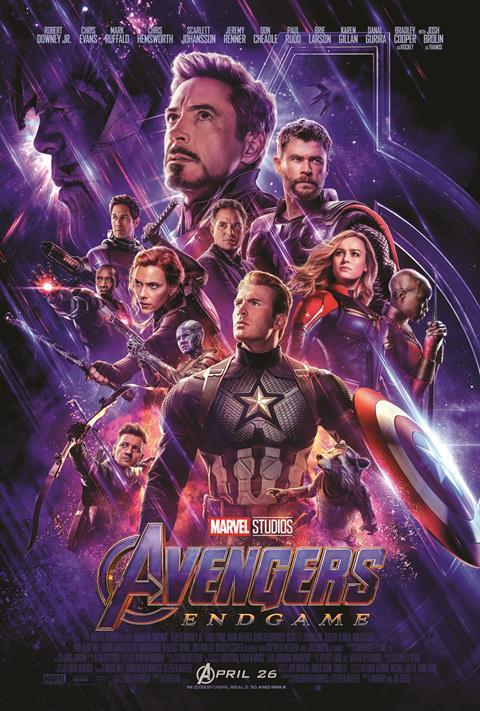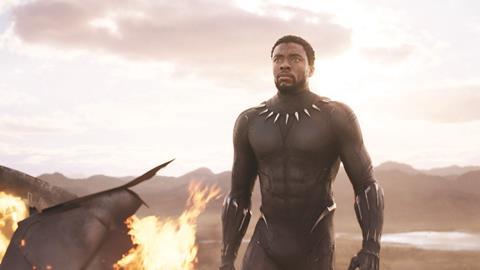The Marvel Cinematic Universe is struggling to attract audiences. But what does that have to do with Christianity? More than you might think, explains Martin Saunders
April 2019. It’s midnight at an out-of-town New Jersey cinema, and I’m holding the hottest ticket in the world. Queues of excited movie fans stream around the outside of the building. Even in America, the land of a billion parking spaces, the car park is full to the brim. The atmosphere is electric with anticipation for the cultural juggernaut we’re all about to jump aboard. It is the opening night of Avengers: Endgame.
Inside the cinema, the fans who’ve waited a year for the sequel to Infinity War enter a sustained kind of fever pitch. Almost every beat of the movie extracts a gasp or cheer; it’s more like sitting in a sports crowd than an audience. As the long-debated plot unfolds, friends chatter to each other: “I knew it!”; “I can’t believe it!”; “That’s genius!” Then the final epic battle begins, and people begin to completely lose any remaining sense of restraint. When Captain America holds his arm aloft and produces the film’s iconic catch of Thor’s hammer, the place erupts. Any dialogue would need to be discovered on a second viewing. It’s pandemonium. And one of the most thrilling evenings of my life.
Avengers: Endgame went on to gross (at last count) an astonishing $2.8bn – making it the second highest-grossing movie of all time behind Avatar. The 22nd film in the Marvel Cinematic Universe (MCU), it cemented the MCU’s place as the superhero franchise above all others. Endgame was just the latest in a dizzying string of hits. It felt like Marvel could do no wrong.
And then…something changed.
The maddening multiverse
After Endgame drew the first phases of the MCU to a close, its ambitious producers began to weave a new story. This one took viewers to a complex new frontier – the ‘multiverse’ – an infinite dimension which created the possibility of many different coexisting versions of Marvel’s characters and stories.
The multiverse was a long-established feature of Marvel’s origin comic books, and seemed like a natural next step for the MCU. Fans, however, weren’t convinced, and began to express concern at the emergence of more complex stories involving lesser-known Marvel characters. While viewers broadly continued to flock to each superhero epic, the glowing reviews and enthusiasm that had greeted previous films began to dry up. The Eternals was underwhelming and full of unsympathetic characters. Doctor Strange in the Multiverse of Madness was confusing and weird, Thor: Love and Thunder an unfunny mess. Suddenly, Marvel’s Midas touch was misfiring. To date, there’s no sign of a recovery.

Doing a few things really well may be the less glamorous route, but it ensures a strong core identity
So what has gone wrong? There are conflicting theories about why the MCU magic seems to have faded. One oft-voiced complaint is that the multiversal storyline, which opens up infinite new worlds without being prepared to let go of any of the old ones, is just too complex. It was already becoming an issue that you needed to know who Dr Strange was before you saw the latest Spider-Man movie; now you really need a working understanding of several different Dr Strange ‘variants’. It’s a lot to hold in your head when you were really just hoping for a bit of escapism.
Related to this issue is the growing multiplicity of Marvel movies and TV shows, supercharged by the ravenous needs of the Disney+ streaming service. Not only do these appear frequently, but each one includes a few important pieces of the growing storyline puzzle. To find out about those Dr Strange variants, you have to watch What If?; to prepare for the long-touted Young Avengers movie, you’ll need to have endured Hawkeye, She-Hulk and more. There’s just too much content, and none of it stands alone; viewers are being asked to engage with it all.
Marvel’s problems have been compounded by a degree of misfortune – though that word feels somewhat lightweight. The untimely death of Chadwick Boseman in 2020 robbed the MCU of one of its brightest stars. Meanwhile Jonathan Majors, already several productions into his role as mega-villain Kang, has been rightly fired after being found guilty of domestic violence. This, together with a series of high-profile Hollywood strikes, has severely disrupted both the planning and delivery of the latest productions.
What if…?
It’s the remit of this column not only to analyse shifts in culture, but also to ask what lessons the Church can learn from them. Like Marvel, the Church bases much of its work on great written source material; it also has a global base of supporter/subscribers, and a dedicated crew of innovators trying hard to help it to become culturally relevant again.
So, are there some helpful lessons to draw from the MCU’s current decline, as both we and they pray for a change in the graph?
First, Marvel are learning the dangers of over-extension. Instead of continuing to tell the stories of a few, popular characters, they have diversified endlessly into new areas in a continual quest for expansion and global conquest. Doing a few things really well may be the less glamorous – and lucrative – route, but it ensures a strong core identity. Churches and their leaders are often similarly tempted to spread themselves thinly, launching a raft of projects and ministries in a quest to meet every conceivable need. This is rarely a sustainable model, as many have discovered.

Second, Marvel are perhaps learning the hard way that it’s important to listen to your audience. While they were skilfully weaving their 20+ film Infinity saga, the MCU’s producers adopted a posture of: “Trust us, we know what we’re doing.” Fan complaints about lack of diversity in the cast, an overreliance on formulaic storytelling and the issue of sprawling complexity largely went ignored by leaders. It’s not difficult to draw a parallel: “Pride goes before destruction”, as Proverbs 16:18 tells us, and leadership that is too arrogant to hear feedback is demonstrating a serious flaw. Pastors and other leaders must listen to, weigh and, where appropriate, implement the feedback of those in their care.
Third, the decline of the MCU – based as it is on a cherished library of comic books – is a reminder to have faith in great source material. One of the many criticisms aimed at more recent movies is that they’ve demanded our interest in the minor characters of Marvel comics – Shang-Chi and the Eternals are two good examples, but the rumours about an upcoming Squirrel Girl film refuse to disappear. These are characters that are barely developed in the comics, in comparison to characters like Iron Man or Spider-Man, who have appeared in literally hundreds of stories. The learning point for us: the strength of all Christian teaching and guidance is rooted in a glorious library of books that tell the story of a few key characters, and one in particular. When we drift away from those origin texts, we instantly weaken.
Five. Years. Later.
April 2024, and the MCU stands at a crossroads. It still carries an enormous amount of goodwill from fans around the world, but there’s widespread acknowledgment that this has been a period of decline. They hope for a revival, and the announcement of films like the Pedro Pascal-fronted Fantastic Four will fuel that hope, but there’s also a distinct possibility that the best days of the franchise are behind us.
As I sat in that New Jersey cinema, filled with whooping superhero nerds like me, the present situation seemed almost unthinkable. Perhaps that’s where overconfidence takes you. Just like the institution of the Church, the MCU is a declining force in desperate need of reinvigoration. The question for both is: how do you rediscover former glories?
Leadership that is too arrogant to hear feedback is demonstrating a serious flaw
Part of the answer surely lies in humbly embracing the reality of the situation as it is now, rather than how it was. Another part will be found in listening to feedback from those who remain invested, even if they are carrying disappointments. Perhaps the greatest lesson of all is that when it comes to telling great, resonant stories, it’s important to keep things simple. The heart of the Marvel comics provided a gloriously uncomplicated idea: that good always wins over evil, and that a saviour will always emerge.
There’s not much more to a great movie – or a great sermon, for that matter – than that.
Superpower your sermon
Six brilliant illustrations from the MCU

While the series may have lost its mojo, there’s no doubting its continued usefulness to preachers everywhere. Here are just six of the many examples
1. God-level power
We can struggle to comprehend the infinite power of God. The two-part Avengers epic offers a helpful metaphor by breaking cosmic power into its elements (power over time, space, matter, reality etc) before bringing them together into one universal force. The evil Thanos might want to use his Infinity Gauntlet to wipe out half of all life, but God uses the same scale of energy for good.
2. One team, many parts
At times the gifted characters of the MCU join forces to combat a bigger foe, as in the Avengers and Guardians of the Galaxy films. Although they have great individual strengths, the team always proves greater than the sum of its parts. This is a useful picture of the Church – and particularly the description of it in 1 Corinthians 12: “Are all apostles? Are all prophets? Are all teachers? Do all work miracles?” asks Paul (v29). In the same way, not all heroes can conjure lightning, spin a web or, err…fire a bow and arrow. Together, though, they can form a mighty team with the skills to do it all.
3. The greatest sacrifice
I think we’re safely past the spoiler stage with this one: Tony Stark dies. His act of self-sacrifice, born out of love, is humanity’s only hope; without him, billions of people will be condemned to eternal death. After the time-bending antics of the Avengers in Endgame, the way is opened up for half the world to experience a kind of resurrection. Gospel parallels abound, but all would be lost without one man laying down his life for his friends.
4. Humility
One of the earliest Marvel movies may not be a fan favourite, but the plot of the original Thor revolves around a hero having to learn a very Christian virtue: humility. It obviously also has an internal Norse theology which doesn’t coexist too well with Christianity, but if you don’t overthink it, Thor himself illustrates how true heroism is found in service, sacrifice and surrendering of the self. It’s also interesting that this movie’s ‘god’ is stripped of his power, and sent to earth as a regular human – just like someone else we know.
5. A mirror to evil
The best superhero films also have super-baddies, and the best-drawn of these in the MCU offer us insights into the shortfalls and sin from which we’ve been saved. Thanos is a maniacal pragmatist who chooses ideology over love; Black Panther’s Killmonger is consumed by vengeance and cannot forgive. Each villain offers us an alternative way to that of Christ, and can provide a helpful contrast to the beautiful values of God’s kingdom.
6. Church is…
When Cate Blanchett’s near-invincible Hela kickstarts the destruction of Thor’s home planet in Thor: Ragnarok, the people are forced to become nomadic. Their realisation that “Asgard is not a place, it’s a people” is a perfect illustration of how churches should never be confused with their buildings. While location and history are important, God relates to a people, not a place.
And that’s not all…there are illustrations of perseverance (Black Widow), integrity (Black Panther), forgiveness (Captain America: The Winter Soldier), the destructive power of anger (The Incredible Hulk), and more. The links might sometimes be tenuous, but there’s no doubting the MCU’s depth as a preaching resource.






































No comments yet